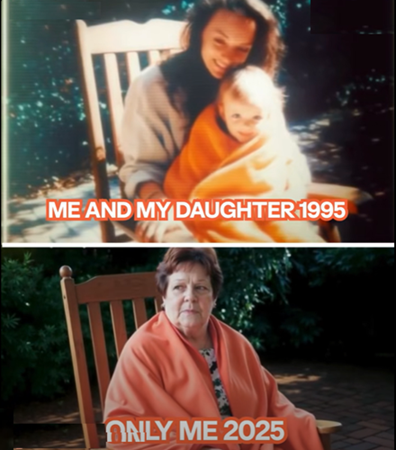
They say a mother’s love is selfless, and I’ve lived long enough to know it’s true. I devoted my life to my daughter Emily, even when she tried to keep me at a distance. Even when I wasn’t welcome in her world.
When Emily was little, my marriage was already crumbling. Her father, Mark, would come home late, smelling of another woman’s perfume, and always gave me that look—the one that said I was the source of his misery. He despised my work as a nurse, insisting that no respectable wife should come home with blood-stained shoes. He demanded I quit, stay home, and be quiet. But I couldn’t stop being who I was.
The day I finally left him, he looked me dead in the eye. “You’ll regret this. I’ll take her from you,” he warned. I didn’t believe him at first. I packed a small bag, grabbed Emily, and went to live with my mother. But soon, court papers arrived. Mark had money, lawyers, and his mother, Helen, who had always looked down on me. The custody battle nearly destroyed me. Every month, I watched my savings disappear, borrowing from friends just to keep fighting for Emily. In the end, I lost. Full custody went to Mark.
I was allowed weekends, holidays, and half of her birthdays—like a mother’s love could be rationed by a calendar. I did my best with what I had. But as Emily grew, I noticed the change. She talked about Mark’s big house, the nice clothes her grandmother bought, and one day she told me, “You’re just a nurse,” echoing the same words her father used—with disdain, not pride. Still, I never stopped loving her. I saved every spare dollar for her college fund, knowing Mark might take credit for it. Even after she moved to the city, we still met—just quietly, away from public view. “Let’s eat at your place. It’s quieter,” she’d say. And I told myself it was enough. At least she still came.
One Wednesday evening, after a long night shift at the hospital, I received a message: “Can I stop by tonight? I have news.” I smiled at my phone like a teenager. I didn’t even change out of my scrubs before I started cooking her favorite meal—chicken casserole with creamy mashed potatoes. When she arrived, she said, “I can’t stay long, Mom.” I insisted she try a few bites, and she agreed, though she barely touched the food. Then she held out her hand, revealing a sparkling engagement ring.
My eyes filled with tears. “I’m so happy for you,” I said. “When do I get to meet him?” She paused. “Maybe… at the wedding.” I was stunned. “You mean I won’t meet your fiancé or his family beforehand?” “They’re… from a different world, Mom,” she said. “They’re successful, and I don’t want it to be awkward.” I looked at her. “Are you ashamed of me?” She didn’t answer. That silence said it all.
The next day, I saw a post on her social media: flowers, champagne, fairy lights. An engagement celebration. When I texted her, she lied and said it was her friend Chloe’s party. Later, I ran into Chloe, who happily invited me to the event and gave me the address.
That night, I put on my nicest dress and went to the salon. “Make me look like someone my daughter wouldn’t be embarrassed to have as a mother,” I told the stylist. I wrapped a gift—crystal glasses I could barely afford—and drove to the house. It was stunning, every detail matching Emily’s description of a “different world.” As I stepped out, Mark arrived and sneered. “What are you doing here? You’ll embarrass her.”
But I walked in. Emily saw me and froze. “What are you doing here?” she whispered. “You weren’t supposed to come.” “Wasn’t supposed to be your mother?” I replied quietly. Before she could answer, her fiancé Ethan approached. “You must be Emily’s mom,” he said warmly. “I’m so glad you came.” Then he led me to his parents.
Their reaction stunned me. His mother Sarah gasped. “It’s you!” she said, clapping. His father smiled. “You were our son’s nurse,” he said. “You cared for him when I couldn’t. You read to him, comforted him, and even made paper cranes.” The room erupted in applause. Emily was speechless. I hadn’t realized their son had been the little boy I had cared for all those years ago.
Mark scoffed. “Applause? For a nurse?” Sarah turned to him. “There’s nothing ordinary about compassion. People like her remind us what truly matters.” I started to leave, overwhelmed, but Emily stopped me.
“Mom, wait,” she said. “All my life, Dad made me feel like you weren’t enough. I believed him. I’m sorry.” Tears filled my eyes. “You were a child,” I whispered. “You didn’t know.” “But I do now,” she said. “Please… stay.”
And I did. For the first time in years, I felt truly seen—not just as a mother, but as a woman whose quiet acts of love had not gone unnoticed. Emily finally realized what I had always hoped she would—that true strength and love aren’t measured by wealth or status, but by the daily sacrifices made by those who care for us most.


